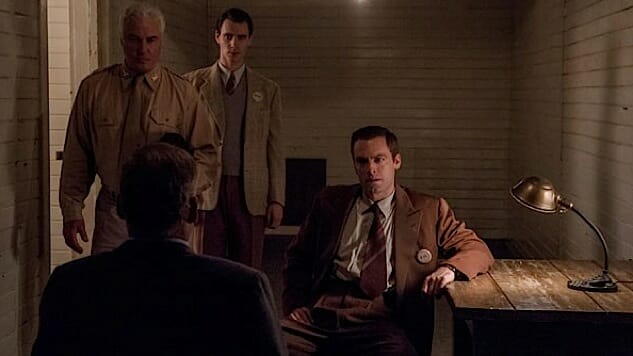Manhattan: “Brooklyn”
(Episode 2.09)

Damn…
As the days edge ever closer to Trinity, Manhattan further tightens the vices on its central characters. It’s certainly no coincidence that the show devotes an entire segment of its running time to Liza explaining the notion of radioactive “fallout” to her colleagues. After eight episodes spent populating an environment with double agents, broken relationships and high-stakes espionage, the chickens are coming home to roost.
Every resident of the Hill walks away from “Brooklyn” with their respective conflicts amped up to 11. But let’s begin by talking about Ashley Zukerman’s Charlie. Here’s a character who has spent the majority of the season feeling more and more impotent, even as he rises through the ranks. Along the way, he’s made numerous hard choices, all under the guise of “the greater good.” Early on in the episode, Abby discovers the extent of her husband’s compromised morality when Colonel Darrow plays her a recoding of Charlie pressuring the colonel to eliminate the Jean Tatlock problem. Horrified that 1) her husband might have been involved in a murder conspiracy, and 2) he actively allowed her to go on believing that she was the responsible party, Abby makes the decision to send away the couple’s son to live with her parents.
Emotionally devastated by his wife’s actions, the Charlie Isaacs that attends the testing committee meeting represents a broken, bitter version of the man he was before. Here, Frank’s advice to make his appeal “personal” backfires in the worst way possible. No sooner has the meeting been called to order than Charlie stands up and flat-out states that the bomb must be deployed on a populated city. “We can be loved or we can have peace, not both,” he explains. “So if we want to change the world, then we need to embrace what the world will call us when we finished what we’ve started: monsters… who erased a city without warning.” He continues, “we have to drop our bomb on a city in the heart of Japan. Because people need something to be afraid of. Fear is now and has always been the only thing that keeps the peace, the only thing that changes the world, changes anything or anyone. We have to be monsters today to stop the monsters of tomorrow.”
-

-

-

-

-

-

-

-

-

-

-

-

-

-

-

-

-

-

-

-

-

-

-

-

-

-

-

-

-

-

-

-

-

-

-

-

-

-

-

-








































